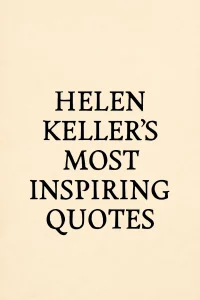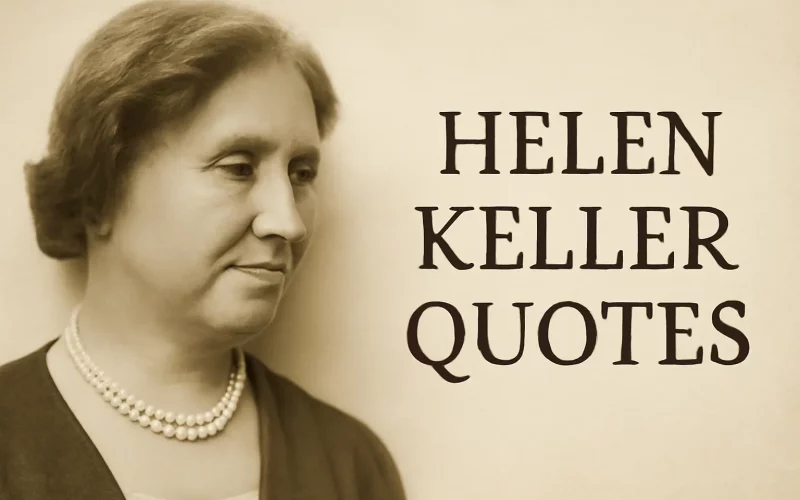Who is Helen Keller:
Helen Keller is widely recognized as one of the most inspiring figures in history. Born in 1880, she was left both blind and deaf after an illness at the age of 19 months. Despite this, Keller went on to become a leading author, activist, and lecturer, proving that obstacles do not have to define our limits. Her journey was filled with remarkable achievements, and her words continue to inspire people worldwide. Keller’s legacy is one of resilience, inner strength, and the power of a positive mindset. In this article, we will explore some of her most powerful and thought-provoking quotes that offer a window into her incredible wisdom.

The Life and Legacy of Helen Keller
Helen Keller’s life story is one of immense perseverance and dedication. With the unwavering support of her teacher, Anne Sullivan, Keller learned to communicate using sign language, braille, and even speech. She was the first deaf-blind person to earn a college degree, and she went on to become an advocate for people with disabilities, a suffragist, and a socialist.
Despite being left without sight and hearing at such an early age, Keller’s achievements shattered the barriers placed on people with disabilities at the time. In fact, her life exemplified how disabilities, when coupled with determination, do not need to be limitations but rather opportunities for growth. Helen Keller quotes focus on themes like courage, vision, hope, and self-reliance. Through her words, she not only taught the world about overcoming personal hardships but also about finding purpose, no matter the odds.
Helen Keller’s Most Inspiring Quotes
-
“Life is either a daring adventure or nothing at all.”
-
Keller’s call to embrace life’s challenges is both daring and empowering. She encourages us to see life as an adventure and to face its obstacles head-on. This quote reminds us that without taking risks, life becomes stagnant.
-
-
“Alone we can do so little; together we can do so much.”
-
Keller understood the importance of collaboration and support from others. She achieved success not just through her own hard work but through the combined effort of those around her. This quote underscores the significance of community and teamwork.
-
-
“The only thing worse than being blind is having sight but no vision.”
-
Vision, in this context, is about purpose, goals, and direction in life. Keller’s words suggest that it’s more crucial to have a vision for your life than it is to have physical sight. Without a sense of purpose, we are blind to the potential of life.
-
-
“Optimism is the faith that leads to achievement. Nothing can be done without hope and confidence.”
-
Keller placed great importance on maintaining an optimistic mindset. She believed that optimism is the foundation upon which success is built. When we remain hopeful, no challenge is insurmountable.
-
-
“Keep your face to the sunshine and you cannot see a shadow.”
-
Keller encourages us to focus on the positive aspects of life. By doing so, we minimize the power that negative thoughts and experiences have over us. This quote teaches us to look for light, even in the darkest times.
-
-
“What we have once enjoyed we can never lose. All that we love deeply becomes a part of us.”
-
This quote emphasizes the lasting impact of love and meaningful experiences. Keller’s perspective on love suggests that what we hold dear stays with us forever, even after it is no longer physically present.
-
-
“The best and most beautiful things in the world cannot be seen or even touched—they must be felt with the heart.”
-
Keller’s deep understanding of life’s intangible beauty is encapsulated in this quote. It suggests that love, joy, and connection cannot be physically perceived but can only be understood through the heart and soul.
-
-
“We can do anything we want to if we stick to it long enough.”
-
Persistence was a core principle in Keller’s life. This quote reflects her belief that with enough dedication and tenacity, anything is achievable. No goal is too distant if we are willing to work relentlessly toward it.
-
-
“Although the world is full of suffering, it is also full of the overcoming of it.”
-
Keller acknowledges the existence of hardship but stresses that the human capacity to overcome suffering is even more powerful. This quote reflects her resilient attitude toward the struggles she faced.
-
-
“What I am looking for is not out there, it is in me.”
-
This quote speaks to self-reliance and the importance of looking inward for answers and strength. Keller’s belief was that our greatest power lies in our ability to change ourselves and our attitudes.
-
-
“Walking with a friend in the dark is better than walking alone in the light.”
-
Keller underscores the value of companionship and solidarity. She believed that, despite the hardships we face, the support of others is invaluable.
-
-
“I long to accomplish a great and noble task, but it is my chief duty to accomplish small tasks as if they were great and noble.”
-
Keller teaches the importance of dedication in even the smallest tasks. Every effort, no matter how seemingly insignificant, should be treated with respect and care.
-
-
“The most pathetic person in the world is someone who has sight but has no vision.”
-
Keller challenges us to think beyond mere physical abilities. True vision is about having a clear sense of purpose and direction, something that many people may lack, even if they have sight.
-
-
“It is not possible for civilization to flow backward while there is youth in the world. Youth may be headstrong, but it has the future on its side.”
-
Keller’s words reflect her optimism about the potential of younger generations. She believed that youth, despite its occasional recklessness, held the key to the future of society.
-
-
“Self-pity is our worst enemy and if we yield to it, we can never do anything wise in this world.”
-
Keller was fiercely against self-pity. She understood that giving in to such feelings only serves to hinder progress and prevent us from making wise decisions.
-
-
“Life is an exciting business, and most exciting when it is lived for others.”
-
Keller found fulfillment in service to others. This quote speaks to the joy and meaning that comes from contributing to the well-being of others.
-
-
“We do not expect people to see with their eyes the things they cannot see with their hearts.”
-
Keller highlights the importance of empathy. Understanding others requires more than just physical sight—it requires compassion and emotional awareness.
-
-
“The only thing that is more expensive than education is ignorance.”
-
A strong advocate for education, Keller believed that ignorance came at a higher cost than any form of formal learning. Knowledge and understanding are the tools needed to progress in life.
-
-
“My dreams were all my own; I covered them with darkness—nothing could dispel them. But the kindness of a stranger, the intervention of a loving heart, gave them a voice and let them come true.”
-
This quote demonstrates Keller’s belief in the power of kindness and support. She recognizes that the kindness of others can bring our dreams to life, even when we feel isolated and disconnected.
-
-
“I am not afraid of storms, for I am learning how to sail my ship.”
-
Keller viewed life’s storms as challenges to be faced and navigated, not feared. This quote speaks to her resilience and ability to adapt, no matter the circumstances.
-
21. “The only thing worse than being blind is having sight but no vision.”
A reminder to not just see the world, but to envision the kind of life we want to live.
22. “A happy life is one spent in the service of others.”
Keller believed that true happiness came from helping others and making a positive impact on the world.
23. “I believe that life is a gift, and that we are responsible for making the most of it.”
Keller felt strongly about making the most of the time we are given, always striving to live a meaningful and impactful life.
24. “Your successes and happiness are forgiven you only if you generously consent to share them.”
Keller viewed success as a communal effort, where the joy and rewards should be shared with others.
25.“There is no king who has not had a slave among his ancestors, and no slave who has not had a king among his.”
A profound reflection on equality and the interconnectedness of human history.












